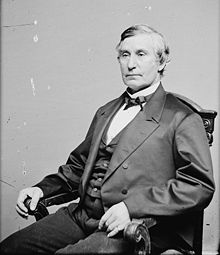Jacob Howard (Jacob Merritt Howard)

Jacob Howard was born in Shaftsbury, Vermont, and attended the district schools and the academies of Bennington and Brattleboro. He graduated from Williams College in Massachusetts in 1830 and then studied law. He moved to Detroit, Michigan in 1832 and was admitted to the bar in 1833 and commenced practice in Detroit. He was city attorney of Detroit in 1834 and a member of the Michigan State House of Representatives in 1838. Howard was elected as a Whig to the US House of Representatives for the Twenty-seventh Congress, serving from March 4, 1841 to March 4, 1843. He was not a candidate for renomination in 1842. He helped draw up the platform of the first Republican Party convention, held in Jackson, Michigan, in 1854. He was the Michigan Attorney General from 1855 to 1861. Jacob Howard was elected as a Republican to the US Senate in 1861 to fill the vacancy caused by the death of Kinsley S. Bingham. He was re-elected in 1865 and so served from January 1862 to March 1871. He was chairman of the Committee on Pacific Railroads in the Thirty-eighth through Forty-first Congresses. As a Senator, he was the chief sponsor of the False Claims Act, the “Lincoln Law”, which permitted whistleblowers to file qui tam lawsuits against government contractors for fraud, with the incentive of receiving a monetary reward based on the recovery made by the federal government. Jacob Howard is credited with working closely with Abraham Lincoln in drafting and passing the Thirteenth Amendment, which abolished slavery. In the Senate, he also served on the Joint Committee on Reconstruction, which drafted the Fourteenth Amendment. During the debate over the first clause of the Fourteenth Amendment, he argued for including the phrase “and subject to the jurisdiction thereof:” Jacob Howard died in Detroit and is interred in Elmwood Cemetery.
Born
- July, 10, 1805
- USA
- Shaftsbury, Vermont
Died
- April, 02, 1871
- USA
- Detroit, Michigan
Cemetery
- Elmwood Cemetery
- Detroit, Michigan
- USA

